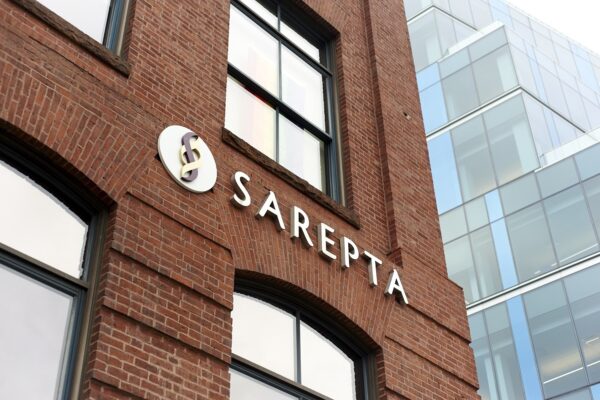
Sarepta Therapeutics’ report of a second fatality this year in a patient dosed with its Duchenne muscular dystrophy gene therapy raised the prospect it might have to pull the product from the market. The company is avoiding that worst-case scenario with a stricter safety warning on the label of the therapy, Elevidys. But Sarepta is also slashing its workforce and its pipeline, moves executives said are needed to keep the firm financially viable.
The corporate restructuring will cut 36% of the workforce, representing about 500 employees, Sarepta announced after Wednesday’s market close. The company projects the layoffs and pipeline reprioritization will save about $400 million annually.
The two Duchenne patients who died, the first in March and the second in June, both developed acute liver failure. These patients were teenagers who were non-ambulatory, which matters because patients who are older and heavier require a higher dose of Elevidys. Sarepta said the FDA asked that the product’s label be updated with a black box warning calling out the risk of liver injury and liver failure. This warning is consistent with other gene therapies delivered by adeno-associated viruses, and Sarepta agreed to the update. The company added that this change appears to resolve any issues for the part of the label referencing ambulatory patients.

The Power of One: Redefining Healthcare with an AI-Driven Unified Platform
In a landscape where complexity has long been the norm, the power of one lies not just in unification, but in intelligence and automation.
In response to the fatalities, Sarepta voluntarily stopped shipments of Elevidys for non-ambulatory patients. The company also convened a committee of Duchenne and liver experts for advice. This committee recommended that Sarepta study the addition of the immunosuppressant sirolimus to the gene therapy’s standard immunosuppression regimen. The committee’s findings will be submitted to the FDA as part of a proposal to test this revised immunosuppression regimen in a new cohort added to an ongoing clinical trial. This six-month study will enroll up to 25 non-ambulatory patients. Sarepta said results could re-establish dosing in non-ambulatory Duchenne patients.
In the two years since Elevidys entered the market as the first gene therapy for Duchenne, the product has fast become Sarepta’s top seller and pushed the firm into profitability. Even with the one-time treatment available now only to ambulatory Duchenne patients, the company projects it will still be a strong seller with a minimum of $500 million in annual revenue in this narrower patient group through 2027. But Elevidys still faces commercial headwinds. In a Wednesday evening conference call, Sarepta executives acknowledged lower interest in the gene therapy evidenced by some patient cancelations following the fatality reports.
Sarepta also markets three antisense oligonucleotide drugs for Duchenne, products that are dosed chronically. The company projects about $900 million in combined annual sales for these products.
Sarepta’s gene therapy research yielded three other clinical-stage gene therapies, all for limb-girdle muscular dystrophies. These programs will be paused, except for the most advanced one, SRP-9003, a potential gene therapy for limb girdle muscular dystrophy type 2E. Sarepta plans to submit an FDA biologics license application for this therapy in the second half of this year, according to an investor presentation.
Sarepta said it will seek strategic alternatives for the paused programs, including potential partnerships with other companies. The firm’s remaining R&D resources will focus on small interfering RNA (siRNA), a type of genetic medicine that works by knocking down overexpression of a disease-driving protein. Sarepta has clinical-stage siRNA programs for facioscapulohumeral dystrophy type 1, myotonic dystrophy type 1, spinocerebellar ataxia type 2, and idiopathic pulmonary fibrosis as well as a preclinical Huntington’s disease therapy. These programs came from Arrowhead Pharmaceuticals under a license and collaboration agreement announced last fall. Sarepta committed $825 million up front, comprised of cash and an equity investment in Arrowhead.
Beyond the programs taken over by Sarepta, the deal also allows the company to select up to six new targets for Arrowhead to research with its RNA interference technology platform. Sarepta said it will continue to work exclusively with Arrowhead to develop therapies for skeletal muscle diseases.
In a note sent to investors, Leerink Partners analyst Joseph Schwartz said the FDA request for a black box warning for Elevidys suggests the agency won’t remove the product from the market. He added that the additional warning and the study of a modified immunosuppression regimen are prudent, and Sarepta’s stock price should get some relief now that the prospect of product removal has been avoided.
“More work needs to be done to get back investor enthusiasm, but this is certainly a step in the right direction,” Schwartz said.
Sarepta said it will record a one-time charge between $32 million and $37 million related to termination benefits. With the restructuring, the company expects it will maintain access to its $600 million revolving credit facility and generate sufficient cash flow to manage its financial obligations, including repayment of a 2027 convertible note.
Photo by Sarepta Therapeutics








